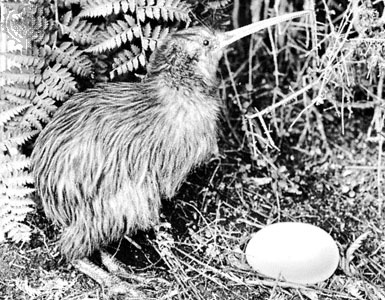kiwi
bird
 any of five species of flightless birds belonging to the genus Apteryx and found in New Zealand. The name is a Maori word referring to the shrill call of the male. Kiwis are grayish brown birds the size of a chicken. They are related to the extinct moas. Kiwis are unusual in many respects: the vestigial wings are hidden within the plumage; the nostrils are at the tip (rather than the base) of the long, flexible bill; the feathers, which have no aftershafts, are soft and hairlike; the legs are stout and muscular; and each of the four toes has a large claw. The eyes are small and inefficient in full daylight, the ear openings are large and well developed, and very long bristles (perhaps tactile) occur at the base of the bill.
any of five species of flightless birds belonging to the genus Apteryx and found in New Zealand. The name is a Maori word referring to the shrill call of the male. Kiwis are grayish brown birds the size of a chicken. They are related to the extinct moas. Kiwis are unusual in many respects: the vestigial wings are hidden within the plumage; the nostrils are at the tip (rather than the base) of the long, flexible bill; the feathers, which have no aftershafts, are soft and hairlike; the legs are stout and muscular; and each of the four toes has a large claw. The eyes are small and inefficient in full daylight, the ear openings are large and well developed, and very long bristles (perhaps tactile) occur at the base of the bill.Dwelling in forests, kiwis sleep by day in burrows and forage for food—worms, insects and their larvae, and berries—by night. They can run swiftly when required; when trapped they use their claws in defense.
One or two large white eggs—up to 450 g (1 pound) in weight—are laid in a burrow and are incubated by the male for about 80 days. The egg is, relative to the size of the bird, the largest of any living species. The chick hatches fully feathered and with its eyes open; it does not eat for about a week.
Although no longer abundant, kiwis appear to be in no danger of extinction and may even be gradually adapting to semipastoral land.
 The genus Apteryx forms the family Apterygidae, order Apterygiformes. Five species of kiwis are recognized: the tokoeka kiwi (A. australis), which includes the Haast tokoeka, Stewart Island tokoeka, Southern Fiordland tokoeka, and the Northern Fiordland tokoeka; the little spotted kiwi (A. oweni); the great spotted kiwi (A. haasti); the Okarito brown kiwi (A. rowi), also called the Rowi kiwi; and the brown kiwi (A. mantelli), also called the North Island brown kiwi.
The genus Apteryx forms the family Apterygidae, order Apterygiformes. Five species of kiwis are recognized: the tokoeka kiwi (A. australis), which includes the Haast tokoeka, Stewart Island tokoeka, Southern Fiordland tokoeka, and the Northern Fiordland tokoeka; the little spotted kiwi (A. oweni); the great spotted kiwi (A. haasti); the Okarito brown kiwi (A. rowi), also called the Rowi kiwi; and the brown kiwi (A. mantelli), also called the North Island brown kiwi.fruit
also called Chinese Gooseberry,
edible fruit of the vine Actinidia chinensis (family Actinidiaceae). The plant is native to China and Taiwan and is now grown commercially in New Zealand and California. The egg-shaped kiwi fruit has a furry brownish green skin and firm, translucent green flesh with edible purple-black seeds at the centre. The fruit has a slightly acid taste resembling that of a gooseberry or perhaps a honeydew melon. It can be eaten raw or cooked, and its juice is sometimes used as a meat tenderizer.
- Morphy, Paul Charles
- Morquio syndrome
- Morrell, Lady Ottoline
- Morrill, Justin S.
- Morrilton
- Morris
- Morris, Alexander
- Morris Carnovsky
- Morris chair
- Morris, Clara
- Morris dance
- Morris, Edward Patrick Morris, 1st Baron
- Morris, Elizabeth
- Morris, Esther Hobart McQuigg Slack
- Morris Fisher
- Morris, Gouverneur
- Morris Graves
- Morris Hillquit
- Morris Janowitz
- Morris Jesup, Cape
- Morris-Jones, Sir John
- Morris Louis
- Morris, Mark
- Morrison, Arthur
- Morrison Formation